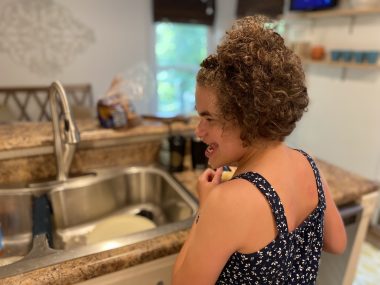Independence Lessens Fear About Providing Lifelong Care for My Angel
Practicing daily living skills benefits both an Angel and her caregiver

Hearing the words “lifelong care” is enough to shock, frighten, and cripple a new parent. I see those words often when I read about Angelman syndrome (AS). But lifelong care becomes more manageable with a higher level of independence, and that’s what I’m working to foster with my 12-year-old Angel, Juliana.
Many parents will probably agree that it seems like yesterday that they brought home their sweet bundle of joy. I have the images in my head of fumbling with the car seat and wondering if we would get it right. Although Juliana is adopted, my husband and I have been her parents since she was 6 days old. We knew there would be a learning curve.
But when Juliana didn’t meet her milestones, it meant something else. The mysteries stopped at a diagnosis of Angelman syndrome. I remember the geneticist meeting with us and explaining that our daughter would require lifelong care. At the time, I could only see life through my new parent’s lens: that we would never retire or be able to launch Juliana into the real world.
Now that we’re living a semi-normal life with AS, I know better. Reading and learning about better care for Juliana and better care for me as a caregiver matter a lot. There are workarounds in this unexpected journey.
Learning real-life skills
My goal is to prepare Juliana to advocate for herself when we can’t. She won’t be able to handle big decisions, but she’ll be able to let someone know when something isn’t going well for her. She’ll need to master some basic skills to improve her quality of life.
Communication is one of them, and she gets that by using her augmentative and alternative communication device to speak her mind. Other skills that are equally important are daily tasks like getting dressed, toileting, and cleaning up after herself.
We started with simple tasks, like cleaning up toys and putting away the napkins after dinner. Clearing her dishes is a skill Juliana started learning at school that we’ve continued working on at home. I’m planning to wait a few more years before we start cooking. It takes longer for people with developmental delays to master skills. Time and a lot of repetition make a difference, so the plan is to keep repeating what she knows and building from there.

Juliana beams with pride after loading her dishes into the sink. (Photo by Sabrina L. Johnson)
Now that Juliana is in middle school, there will be more focus on daily living skills. Her class just had their first community-based instruction at a big-box wholesale store. They practice hygiene and toothbrushing every day. I’ve yet to find any dedicated articles about adults with Angelman syndrome who live completely alone. However, I’ve learned of many who are doing just fine with developed skills and care from family or care centers.
Lifelong care doesn’t sound as menacing as it did 10 years ago. Juliana is learning and practicing more each day. So am I. And I’ve educated myself enough to know that lifelong care doesn’t mean life-burdening care. Like so many of the adjustments we’ve made with AS, we must view our future outlook with a different lens and road map.
Note: Angelman Syndrome News is strictly a news and information website about the disease. It does not provide medical advice, diagnosis, or treatment. This content is not intended to be a substitute for professional medical advice, diagnosis, or treatment. Always seek the advice of your physician or other qualified health provider with any questions you may have regarding a medical condition. Never disregard professional medical advice or delay in seeking it because of something you have read on this website. The opinions expressed in this column are not those of Angelman Syndrome News or its parent company, Bionews, and are intended to spark discussion about issues pertaining to Angelman syndrome.








Leave a comment
Fill in the required fields to post. Your email address will not be published.